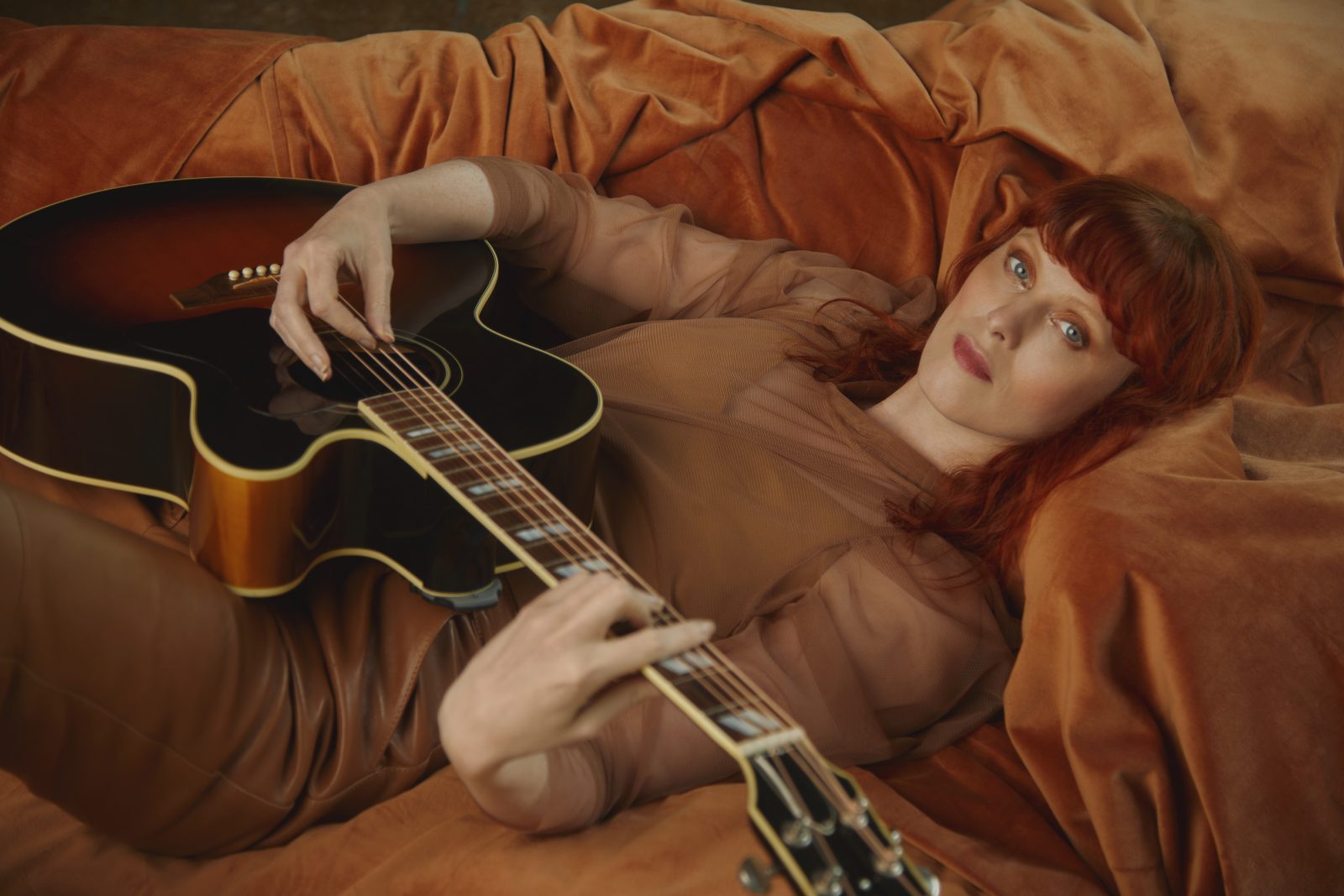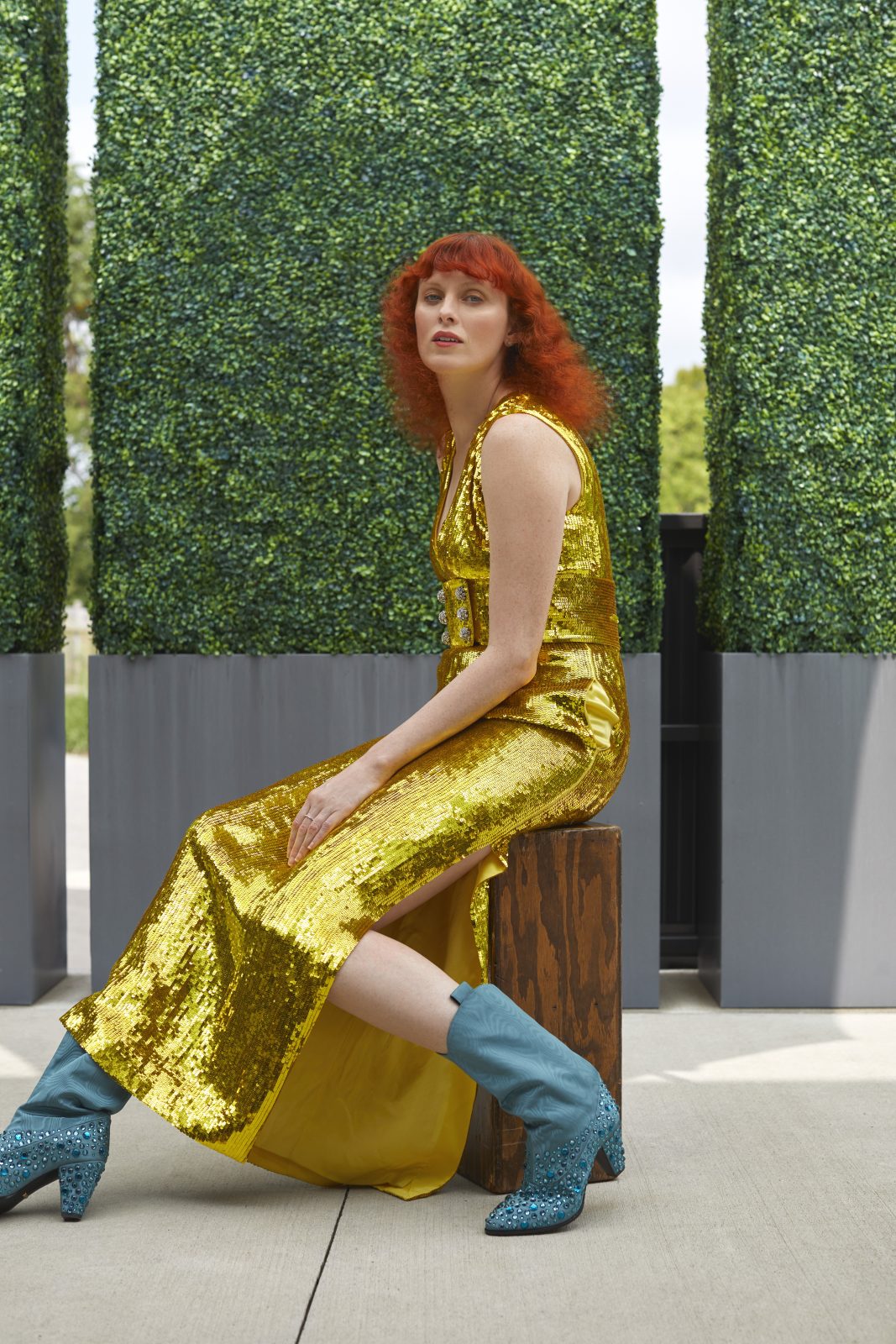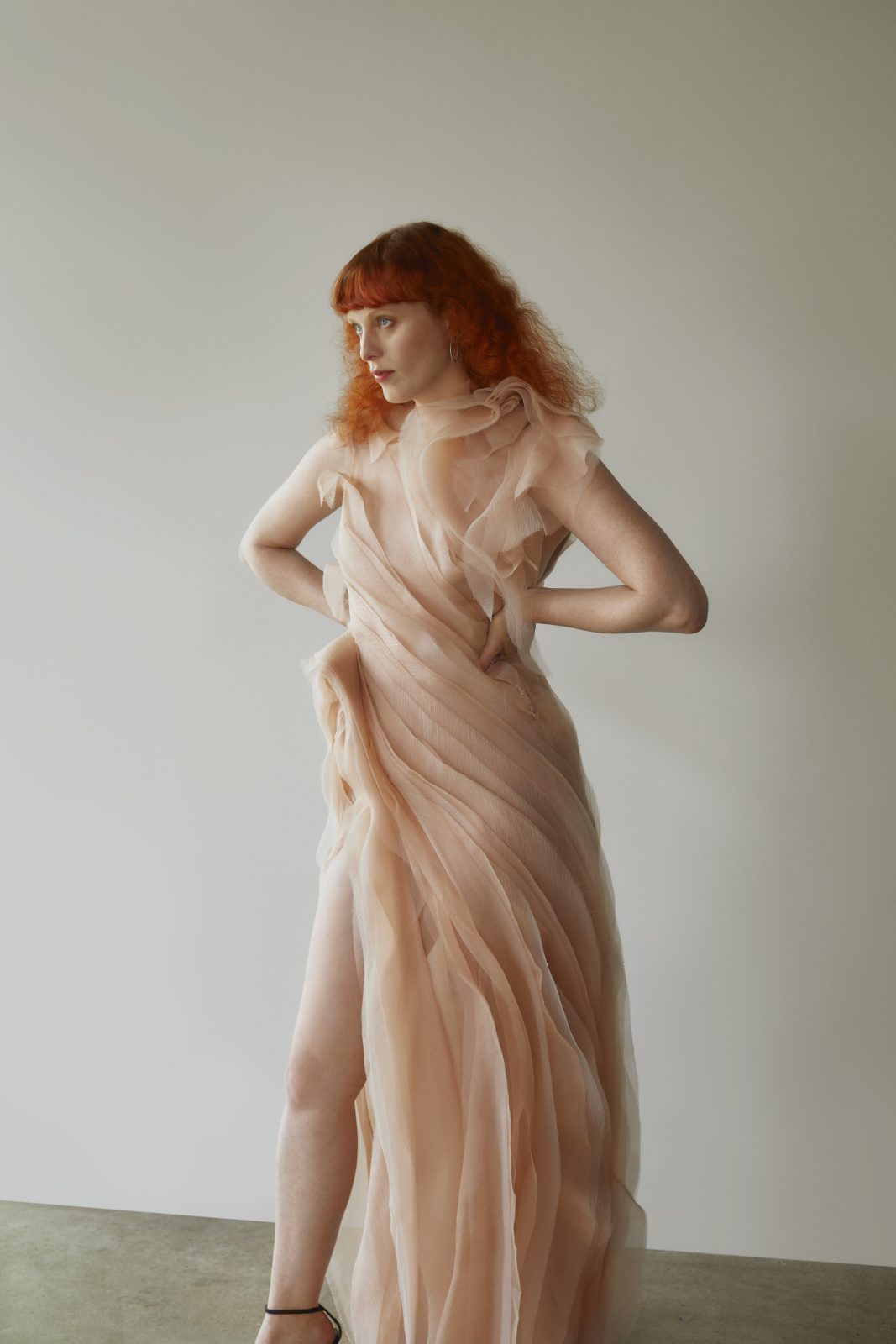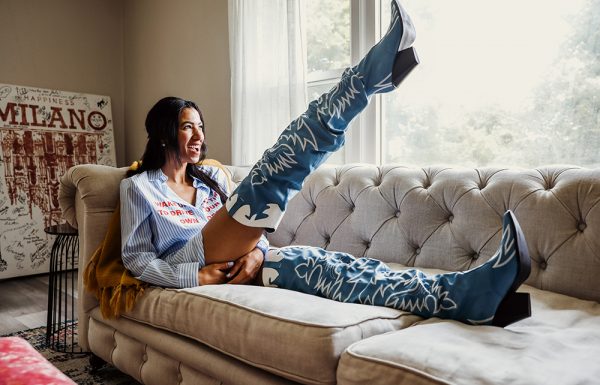You may recognize the face from Chanel and Dior campaigns or countless magazine covers—from Vogue and Elle to Bazaar, W, Nylon, and In Style. Now she’s revealing the person off of the page with a heartfelt memoir of her struggles to make it as a model and how she finds release through music.
Just a few days after honoring the Edit team by posing for an extensive but super-fun photo shoot, Karen Elson was ready for this interview. Her attitude is peppy, lighthearted, and genuinely apologetic for her dodgy internet service and being a few minutes late to the chat. In her sharp-as-a-knife RP accent, the eternally polite Brit explains that she got behind because she was bathing her golden retriever. Unfortunately, the pup had an accident in the dog bed the night before. Yikes! The working mother of two scrubbed the dog and cleaned up the mess in between sending emails and preparing for an Instagram Live event. In short, even though her closet’s overflowing with couture and her friends are among fashion and entertainment royalty, Elson understands what it’s like to spin plates and sometimes lets them drop.

Muse to design legends, including Karl Lagerfeld and Tom Ford, photographer Steven Meisel and makeup artist Pat McGrath, she’s been wildly popular with the most reputable names since launching her career at 16. While others have accepted recognition for technically making her into ‘Karen Elson the supermodel,’ it’s obvious after talking with her for two minutes that she is brilliant and was actively involved in creating her brand. Elson is too much of a polymath, sharp thinker, and creative talent to serve as just a muse. She’s also an acclaimed singer-songwriter, coming into recognition as an artist alongside her former spouse, rock star Third Man Records founder Jack White. At the moment, she’s focused on shattering the collective image of what it’s like to live at the top of the fashion food chain. In addition to solo recordings and representing luxury designers, she’s adding author to her resumé. In her debut book, The Red Flame (10/20; Rizzoli NY), Elson shares a brutally honest accounting of her journey on becoming internationally famous, from a troubled childhood to a stream of unfair, abusive encounters and experiences during her 25+ years as a model. Just a hint, it’s even more horrifying and hard to digest at times than you would think. Through it all, this British-born siren has retained her working-class roots to remain grounded, grateful, and impossibly kind. Elson may have become a household name for her translucent complexion, statuesque frame, and fiery red locks, but there is much more to her than meets the eye. At 41, it’s time she told her side of the story.
When Elson started discussions with Rizzoli Publications about writing a book, she was crystal clear about her vision. She knew from the start that the book had to be more substantial than a collection of beautiful, powerful photographs. While it does include dozens of curated pictures from her career and life, the book also poetically reveals her truth. The book’s text also demonstrates the fact that she’s a tremendous writer. The book’s story starts with her childhood when at age 7, she began developing an eating disorder due to troubles at home and vicious bullying she experienced from schoolmates and peers about her appearance and status. It’s almost unimaginable that she grew up with people calling Elson fat, ugly and worthless, but those labels were frequent as she struggled through her earliest years. Hailing from an impoverished working-class family in the small industrial town in North Manchester, UK, people taunted her for being pale-complexioned and thin-skinned in an environment where showing your emotions wasn’t cool. Being empathic and internalizing the criticism, she knew that she had to ‘get out of dodge,’ vowing to make it as a model and never come back.
She shares details on her transition into the world of modeling and traveling around the world as a teenager. Elson doesn’t airbrush the constant struggle she underwent to create hall-of-fame-worthy images. She paints a vivid picture of the inhumane mistreatment a model endures to make it, usually at a very young age. To be anointed by the rulers of high fashion’s hierarchy and chosen as a canvas for design visionaries, living on air (instead of food), and going with the flow no matter what’s involved isn’t unusual. In this ‘Wild West’ world of all things, beautiful is sadly just part of the process for many.
“While my songs are deeply personal, which gave me courage, I had to dig even deeper with this book because I wanted to be both honest and vulnerable,” she explains. “In real life, I’m attracted to people who don’t just show the shiny, happy sides of themselves.” While her goal was to address complicit activity in the modeling arena that only strong regulations and enforcement will change, she also wanted to reveal her tenacious spirit. Most importantly, she wanted to emphasize that she has walked a true path. “There were so many people who told me things I wanted to do were impossible, which is why I had no choice but to believe in myself,” she explains. She had to work hard and build her career to survive—as she grew up poor and had no other support or any kind of backup plan. Her moral compass and self-belief carried her forward, and that same internal confidence continues to define Elson today.
The highly self-reflective writer also saw writing The Red Flame as an opportunity to understand and explain to others why she even became a model. The model plan implanted (at age 7), despite her dealing with strife both at school and home. But once that spark of possibility was in her mind, everything spiraled from that point. During today’s uncertain times, when many people need self-belief more than ever before, Elson was driven to prove how a single vote of confidence (even if it’s your own) can change the course of your life.

She has returned to her hometown but reveals that it still isn’t easy, especially after being publicly trashed by the notoriously hateful British media. Targeted press reports included accusations about her lacking gratitude over her successes for someone of her ‘rank’ in society. She achieved the impossible dream—worldwide success, which has also been judged harshly by the British. She became famous for being her wild, quirky, and fascinating self. Yet, she is sincere in admitting that it was like pushing a boulder up the hill the entire time.
“There were so many occasions where I could have shifted and morphed into the 110-pound person they wanted me to be,” the 5’10 maven explains, hinting at the horror stories she reveals in The Red Flame about being humiliated and blacklisted at times over a few pounds. After reading her story, it’s obvious why she elected to eat whatever she wanted during quarantine and got immense joy from flaunting her naked body in photos. After being shamed for transitioning from a flat-chested girl to a woman, she is now positively accepting her shape—especially her curves. “I’ve had my spirit broken and been compliant because I didn’t know that I deserved more,” she says with an almost uncomfortable laugh referencing a culture that perpetuates eating disorders, substance abuse, and even being rewarded for self-destructive behavior.
Elson is no tragic hero and remembers reading an old report card on which the teacher had written that she had a ‘keen sense of justice.’ While the chameleon may have adopted characters, accents, and languages in her sleep, her integrity and moral ground have always been consistent. “If people encroach upon my dignity, I have to stand up for myself,” she says. While she’s always recognized distasteful behavior in others, the beauty of getting older is that she now understands how to confront it. Over the years, Elson has become more comfortable in her skin and standing in her truth. She also feels responsible for standing up for others who have undergone similar situations or have been disenfranchised by the fashion industry. Referencing the (unofficial but practiced) global fashion industry standard belief that a model should be a blank slate who turns a blind eye to bad behavior, Karen adamantly disagrees. “As models, we are often held to the notion that the fewer people know about us, the better. The assumption is that we don’t have much to say, which I believe is both disrespectful and untrue. Most of the models I’ve worked with are incredibly interesting, dynamic, and multi-faceted women.” She hopes to incentivize people to look beyond the magazine spread to understand that the women in the photographs are real people who have brains.
Many people in fashion are silenced or made to feel like their voices don’t matter—that’s especially true for models. “People expect models to be passive entities without opinions to agree with whatever is requested, and I’m not down with that!” Elson says, laughing at the absurdity of it all. After many book edits to whittle her word count down, she succeeded in clearly getting the message through. Models are much smarter, more perceptive, and braver than the public gives them credit for, and that’s a fact.
With the support of the #metoo and #timesup movements and a general affinity for extreme transparency in 2020, Elson remains resolute that her peers shouldn’t have to suffer for beauty. Yet, while Elson could preach for days about the injustices, she isn’t out for pity but instead aims to use her position to protect the next generation by campaigning for tighter regulations. Elson also admirably acknowledges that she wouldn’t be in the place to ‘tell it like it’ is if she wasn’t already at the top. “I hope that I can use my experience to show models what they are getting into,” she says.

She has forgiven (or at least tried to forgive) those who wronged her in the past. Even revealing hard truths in writing was a bit scary. “Am I ready to say this, and what will the consequences be if I do?” are questions Elson asked herself when editing the book. She walked a virtual tightrope to prevent committing career suicide—making it her mission to stay honest without throwing her contemporaries under the bus. “People will speak about their most vulnerable experiences, and then there will be an army of people who do their damndest to negate that person’s reflection because they don’t see it the same way,” she says (getting fired up). “I had to censor myself at certain points because while society is way more open today when someone feels like they are being attacked, doors can still slam shut. While I was writing, I had to toe the line between telling my truth and having to duck and dive at other times,” she remembers, “I did not want people to come after me with pitchforks.” She hopes to change this old-guard ideology—‘because your contemporaries behave badly, then you can too.’ Forgive she may, but forget she won’t. While it has understandably taken time for Elson to have any compassion for those who hurt her, she forgave for herself. “While it sounds a little hokey, life is short, and I cannot carry that stuff around with me forever,” she says. She has self-reflected, been accountable for her errors, and made amends to the appropriate people. Her actions are focused on inspiring the same decency in others. Her ambition is to be the bigger person—not a pushover.
“People will speak about their most vulnerable experiences, and then there will be an army of people who do their damndest to negate that person’s reflection because they don’t see it the same way.”
—Karen Elson
To reduce the number of people who would complain or comment with statements like “I’ve never seen this before” or “Don’t make a big deal out of nothing,” she wrote from the perspective of talking to a stubborn industry friend. She understands that others may not want to change and might overlook toxicity and systematic issues in fashion because speaking out is seen as an inconvenience. But Elson is a realist and knows even though some accept her trauma is clarity and compassion, many others likely will say, “well done,” and then keep doing things in the same way as they’ve always done. However, while she has been applauded by many for her honesty, Elson is no fool. Caution is why she chose to skate over specific topics and to not name names. “You wouldn’t believe how many people have reached out to me and said, “What you’re saying we’ve known all along but have been afraid to say because it can harm your career,” she says with a smile in her voice.
Even better than giving a voice to the voiceless, writing a book gave Elson confidence in her songwriting abilities once again. Whereas she used to ask herself if people liked her music, now she’s singing a different tune. “While I’m a very stubborn, tenacious, and driven human being, I also have fears and feelings of inadequacies,” she says.
“But now I tell myself ‘whatever’—stop questioning your talent and start songwriting again.” Hopefully, now that she has blown the lid off several ill-fated encounters with top rock ‘n’ rollers like Ryan Adams, her second book will be about misogyny in the music industry. Her current album is impressive, and the soothing video clips she shares while singing and playing guitar via her Instagram account draw thousands of listeners who just can’t get enough of her sound.
After countless top magazine covers, serving as the face of numerous luxury fashion campaigns, and walking at every coveted runway show in the world, supermodel Karen Elson seems to get the most satisfaction from speaking her mind. Perhaps, after a 25-year career spent in silence, this is her definition of success.






